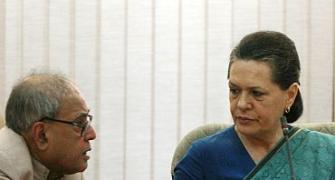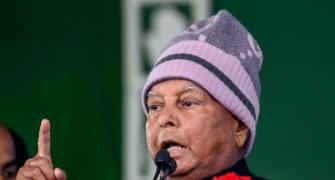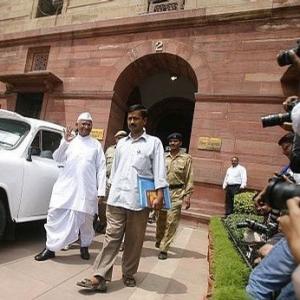Do not defend corruption by advancing specious arguments as to who is authorised to speak for the people. Everyone who raises his voice against corruption speaks for the entire country, says Virendra Kapoor.
Ever since Anna Hazare launched the anti-corruption campaign, apologists of the government have sought to undermine it, arguing that civil society activists represent nobody but themselves.
Sections of the media insist that only the government has the right to speak for the people since it commands a simple majority in Parliament. At a superficial level, the argument is strong. But is it valid? No.
On a careful examination, even the government cannot claim to speak for the entire populace on all issues under the sun. For want of a better mechanism to determine the wishes of the majority of the people, the first-past-the-winning-post electoral system may be the best way to elect governments.
The parties constituting the United Progressive Alliance, for example, polled only a little over 37 percent of the popular vote; the non-UPA groups, on the other hand, accounted for more than 62 percent of the votes polled in the May 2009 election.
Indeed, successive governments in free India were in a way minority governments insofar as they enjoyed the support of less than half the voters who had actually cared to vote. Those who did not exercise their right to vote also constituted a sizable chunk of the electorate and, therefore, no government could claim to speak for them, though necessarily the writ of any government would apply uniformly even over those who voted against it.
The short point is that while the systemic convenience allows all governments with barest of majorities in Parliament to speak and act on behalf of the people, these should not arrogate to themselves the right to silence the voice of anyone who expresses a dissenting opinion.
To cite an example, can the defenders of the moribund UPA regime claim that Indira Gandhi spoke for the entire people when she imposed her draconian Emergency in June 1975? Mind you, she had an overwhelming majority to support the Emergency proclamation in Parliament.
Apologists of the government who run down the current anti-corruption campaign by Anna Hazare and other civil society activists can be relied upon to justify the Emergency, if for nothing else than to maintain consistency in their line of reasoning. But, as subsequent events proved, the Emergency did not have the support of the people, even though it was duly endorsed by a captive Parliament.
Why, the British Prime Minister Neville Chamberlain had no difficulty getting the nod of the House of Commons for his sell-out agreement with Adolf Hitler. And Hitler himself did what he did with the full support of the Reichstag.
Or, nearer home, can one ask these unabashed defenders of the ruling establishment whether Rajiv Gandhi had lacked majority when he came up with the controversial Anti-Defamation Bill which caused the late newspaper doyen, Ramnath Goenka, to lead a public protest.
If the editor of a pink paper, who is beholden to the prime minister, was to be believed, what Goenka did was wrong -- Gandhi ought to have pressed ahead with his infamous bill to fetter press freedom since he had an overwhelming majority in Parliament.
This is what could be termed the real tyranny of the majority. And not what Hazare seeks to do through his peaceful anti-corruption campaign could by any stretch of imagination be termed as `tyranny of the unelected.'
There is little doubt that on the issue of corruption Anna Hazare and Baba Ramdev have touched an emotional chord with the people and the government, despite its mechanical majority in Parliament, is woefully deficient in popular support.
So to argue that a corrupt government which has the support of the Parliament, with as many as 30 percent of its members facing serious criminal charges, is better than a non-democratic government which is corruption-free, is wrong. For, the corrupt government too lacks the popular support though it has a simple majority in Parliament. As for the corruption-free but anti-democratic government, well.., given a chance it would establish its popular support.
Also, the legitimacy of a constitutional government is not damaged when people come out on the streets against its egregious behaviour, or against an unending series of scams. It is damaged when a constitutional government most brazenly turns into a cash-and-carry government as the Manmohan Singh government most certainly has.
Let us also dispose of the argument that using fasts as a method of protest to bend governments have no place in a democratic polity. Congressmen, and their apologists in the media, have proverbially short memories. India's first prime minister Jawaharlal Nehru, no less, had to bow before the fast-unto-death of Potti Sriramulu for the creation of a separate Andhra Pradesh.
It was his fast and his death that paved the way for the creation of the state of Andhra. Was Nehru wrong in doing so? In our view yes, he was. He ought to have gauged the strong feelings of the Telugus for a separate state without waiting for the Gandhian to sacrifice his life to concede his demand.
The point is that there is a groundswell of public opinion which fully backs the anti-corruption crusade. One may have differences over the specific demands raised by various civil society activists, one may be unhappy with some of their public utterances, yet there is no denying the merit and popular support for their overall case.
To cleanse the government, civil society activists' needs must be supported. Besides, anyone who raises his voice against what is easily free India's most corrupt and most ineffective government cannot be silenced by the specious argument that he lacks numbers in Parliament. Numbers will come because the cause is laudable.
Only the purblind can deny that corruption is eating into the vitals of this country. It has taken away from the poor their daily bread, from children of school-going age their schools, from tax-paying citizens their roads, water, power supply and public transport systems, and from all Indians their pride in the nation.
Foreign investors are shying away from India not because Hazare and Ramdev are on the streets against corruption. No, because there is an over-powering stench of corruption in the government. Fight corruption. Do not defend it by advancing specious arguments as to who is authorised to speak for the people. Everyone who raises his voice against corruption speaks for the entire country.







